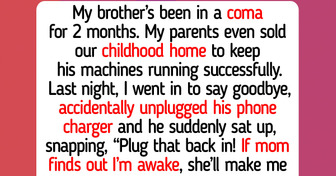❤❤❤❤❤❤❤❤❤❤❤💯
10 Things Every Child Should Hear From Their Parents to Strengthen Their Self-Esteem

We parents all hope that in the future our children will be responsible, successful, and happy adults. Their childhood will be the perfect time to start encouraging them and giving them the necessary tools so that, ultimately, they can achieve everything they set their minds to. By reinforcing their self-esteem and helping them to trust themselves and manage their emotions, they will be ready when the time comes to face the “adult world” with courage and determination.
Bright Side compiled the most powerful positive reinforcement phrases you can use with your kids on a daily basis to help them develop golden self-esteem.
1. “You can count on me” or “I’m here to help you”

Whenever you see that your little ones doubt themselves or want to do something, but they can’t seem to get the courage to do it —either because they don’t know how to do it or because they are afraid— remind them that you are there for them. Let them know that they can count on you and that they have your support and your help if needed. Just knowing that you are there for them will encourage them to try and they may succeed, even if you don’t have to help them.
That is why it is vitally important for children to feel that they can count on their parents whenever they have a problem. This kind of phrase, besides reinforcing the bond and trust between parents and children, will also give children a lot of security and self-confidence. These phrases will help them to avoid fear, knowing that if “something bad” happens, mom and dad will be there to protect them or help them.
By learning and practicing these attitudes from infancy, their growth and development will be easier, especially later in life when they begin to deal with more serious situations.
2. “Tell me” or “I’m listening”
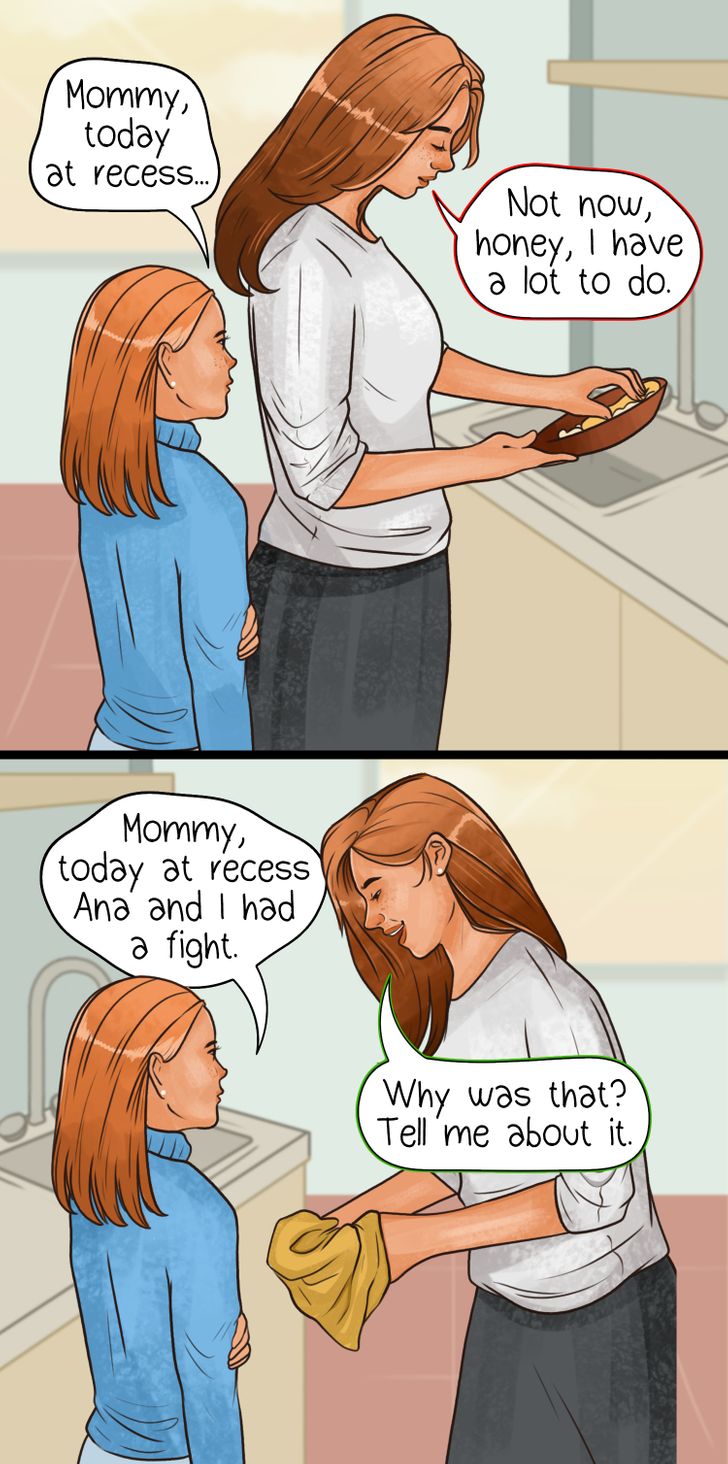
This sentence is closely linked to the previous one, we can’t say “I’m here” if, later, when they want to tell us something, we don’t have time to listen. That sends a completely opposite message: “I’m not here,” “I don’t have time for you.” The moment your child wants to share something with you is the best time to show them that you are really there.
Stop what you are doing, for you it will only be a few minutes, but for your children, it will mean that you care and that they can count on you. Listen carefully, don’t make fun of their story or downplay its importance. If they wanted to share it with you, it is because it is important to them. Don’t interrupt them. If you want to give your opinion or add something, wait until they finish.
What you can do is show interest and excitement in what they tell you: “Really?,” “Wow,” “Amazing,” children love this. This is an ideal way to start building good communication with your children and reinforce their confidence in you. Then, as they get older, they will want to continue to share their experiences and concerns with you.
3. “I love you very much” or simply “I love you”
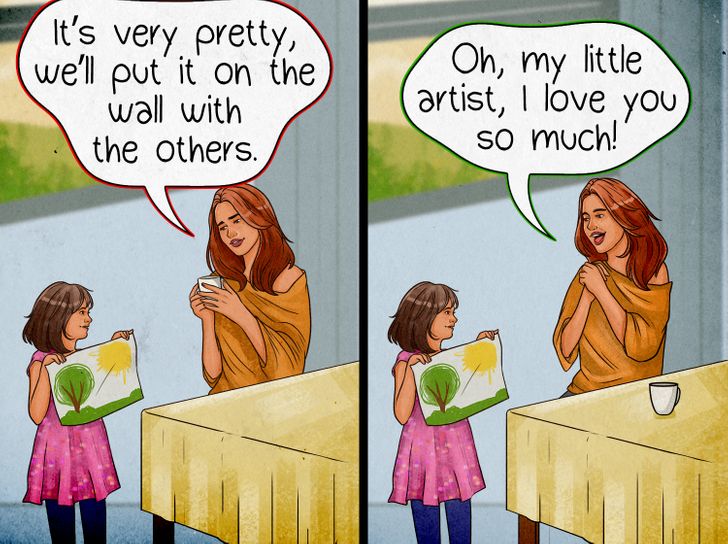
We take care of them, look after them, pay for their education, arrange their after-school classes, buy them everything they need, and even don’t sleep a wink when we are worried about them. All this and more simply because we love them and they are the most important thing in our lives. However, for a child, reaching this conclusion is not as simple. That is why specialists recommend that, in addition to showing children our love through our actions, we should also do it verbally.
These 2 phrases are extremely powerful — a positive reinforcement with multiple benefits:
- It strengthens the bond between parents and children and improves family communication.
- It gives children confidence and peace of mind, as they feel surrounded by love.
- It reinforces their self-esteem and helps them to love and accept themselves as they are.
- It allows them to grow happily, transmitting and providing that happiness to their whole environment.
- It strengthens their emotional intelligence and their relationship with their feelings.
- Children who feel loved are positive and optimistic.
- They show politeness and respect for others.
So, whenever you can, take the opportunity to tell your children how much you love them between hugs and kisses.
4. “Do you forgive me?”
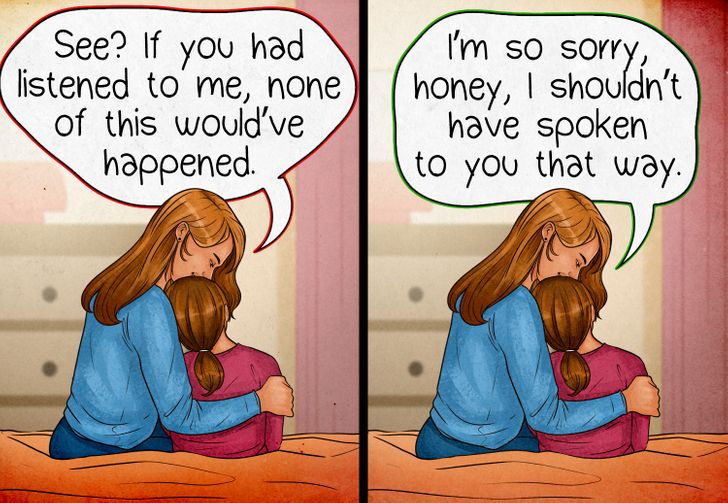
As imperfect human beings, we all make mistakes, mom and dad included. And what better way to teach our children to accept and take responsibility for their mistakes than by leading by example? When they see that we, their favorite superheroes, put aside our ego and ask for forgiveness, they will realize how important it really is.
Many times, we not only do not ask for forgiveness, but we force our children to do it. In these cases, we send children a very confusing message. Instead of fostering empathy for others, by forcing them to do something they don’t want to do, they feel that we are victimizing them, causing them to put their focus on their personal discomfort and not on that of the real victim.
Therefore, whenever you think you have made a mistake — raising your voice too high, applying an undeserved punishment, or being unfair in any aspect with your children— offer them a sincere apology that is adapted to their age. Explain where you went wrong, how you feel about it, and what you’ve learned from it so your children can understand and apply it as well.
5. “I believe in you” or “I trust you”
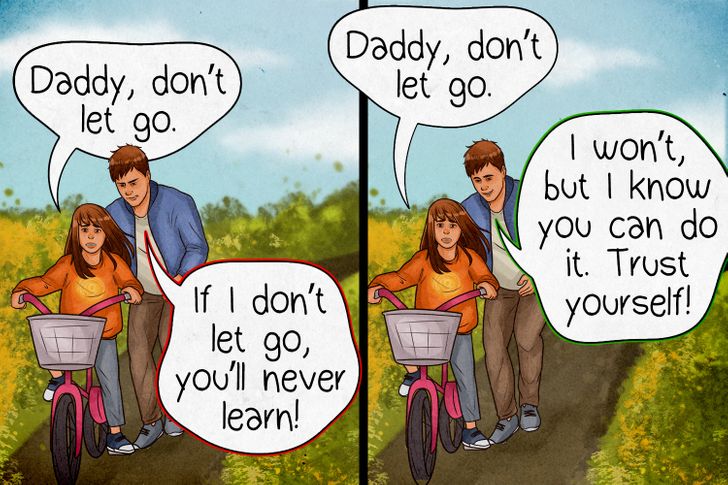
When we are little, knowing that mom and dad trust and believe in us makes us feel, as if by magic, all-powerful because they know everything. And even if what we want to do doesn’t work out right the first time, continuing to count on their trust helps us to not get frustrated and to try again.
It is not a matter of lying to children and telling them all the time that we trust them to do whatever it takes, knowing that on certain occasions they won’t really be able to do it. It may be because the task is not adapted to their age, they aren’t yet ready, or it is simply impossible (like flying or moving objects with their minds, among other children’s fantasies). Our confidence must be real and justified.
By trusting them, you will help them develop self-confidence. They will believe that they can (which is the first step in being able to), they won’t give up easily and will look for alternatives and solutions that bring them closer to their goals because they are sure of themselves and trust that they will achieve them.
6. “I get you” or “I understand how you feel”
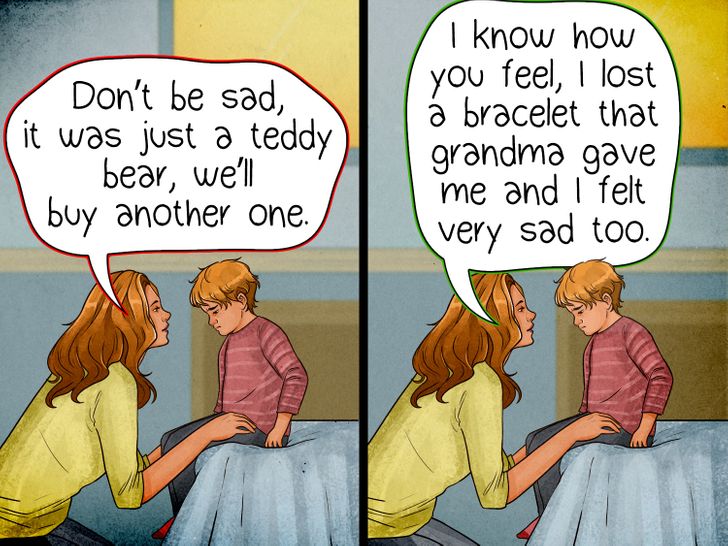
This phrase reflects empathy and a connection with our children’s feelings and makes it clear to them that they can count on our understanding and support. For both children and adults, knowing that someone understands us makes us feel supported, identified, and calmer.
When children feel that they aren’t understood, they become frustrated, and this frustration can lead them to develop very negative feelings that lead to inappropriate or aggressive behavior, unjustified tantrums, uncontrolled crying, and screaming, among other things. This is their way of desperately expressing all the incomprehension they harbor inside.
A simple and honest “I understand you” at the right time can make all the difference. We can give even more strength to this phrase by sharing an anecdote in which we have lived a similar situation or have felt the same as them. This way they’ll see that not everything is always perfect and that good and bad things happen to everyone, including mom and dad.
7. “Cry as much as you need to.”
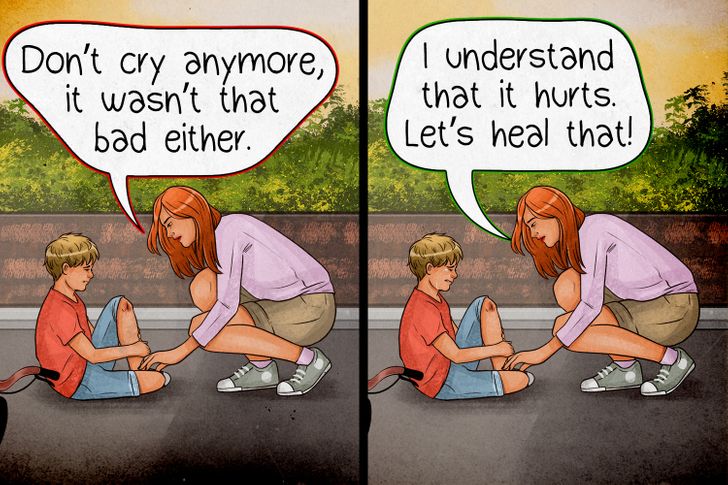
Crying is a completely natural process that both children and adults experience in certain situations. It isn’t chosen, it just happens, and it isn’t forever. As soon as we start to feel relieved, we stop crying. Asking children to not cry is asking them to repress their emotions, and that way they will never learn to manage them.
Phrases as common as “be brave,” “men don’t cry,” “it’s all right,” even if they are said with all the good intentions of relieving our little ones’ grief, have a very negative effect. To begin with, the first 2 statements are lies: both brave people and men do cry, and that doesn’t make them any less brave or masculine. Also, yes, something does happen, because if nothing happened, the child wouldn’t be crying. To claim that “nothing is going on” when they are feeling the opposite is to downplay their feelings.
Therefore, the best thing you can do is to let them vent, listen to them, and offer your support, always seeking to help them understand what they are feeling in a healthy and constructive way. Emotions and feelings — both positive and negative — will definitely be part of their day-to-day life for the rest of their life.
8. “I’m proud of you.”

This is another powerful phrase that parents should use often with their children, but with awareness and when the situation warrants it, to praise the moments of effort and self-improvement of the child. Don’t focus on the result they obtained, but on the work they did to achieve it, the process they went through, the obstacles they overcame, and the fact that they didn’t give up. Those are the attitudes that should be praised beyond the result they obtained.
It is easy and normal to show the pride we feel for our children in front of third parties: “My son is already walking,” “My daughter was elected class president,” “My son passed the course with very good grades.” Their achievements — however small or big they may be — make us so happy that we want to share them with the world. But we must not forget that the most important thing is to share them with kids so they know how proud we are.
As with almost anything, too much of a good thing can also end up being bad, and praise is no different. Praise should always be justified and given at the right times, thus giving your children more self-confidence and positively reinforcing their self-esteem. However, too much praise for no real reason can cause your child to become arrogant and behave well only to get a reward.
9. “Your opinion is important to me.”
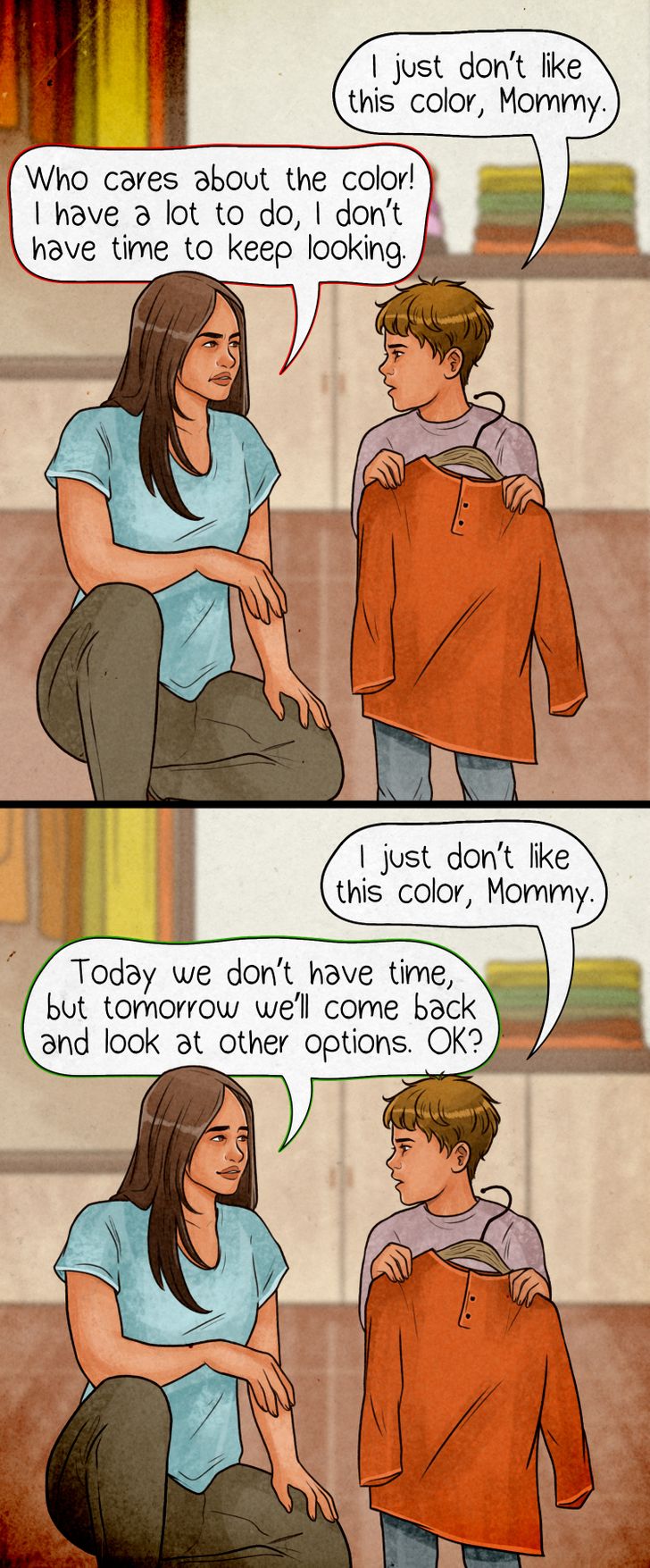
It is clear that we always want the best for our children, even if they often don’t understand it or don’t like it. That doesn’t mean that “they must do as we say,” and that we don’t let them have a say or don’t listen to their point of view. Including the opinion of our little ones in certain family decisions reinforces their self-esteem and makes them feel happy and an active part of the family.
Their adult life will be based on decision-making, so it is important that they begin to develop this ability from an early age. If mom constantly tells us what we should do —without letting us think about it or have a say— the day mom is gone, we won’t know what to do. So whenever you have the opportunity, ask your children for their opinion. For example, ask them about what to do on the weekend, what to give a family member for their birthday, or what movie to see, among other similar situations.
In addition to listening attentively, we can invite them to argue their point of view and explain why they think it is the right thing to do. Letting them share their opinions will not only be beneficial for them, but also for their parents since it will give them a lot of information about their personality.
10. “Thank you very much.”
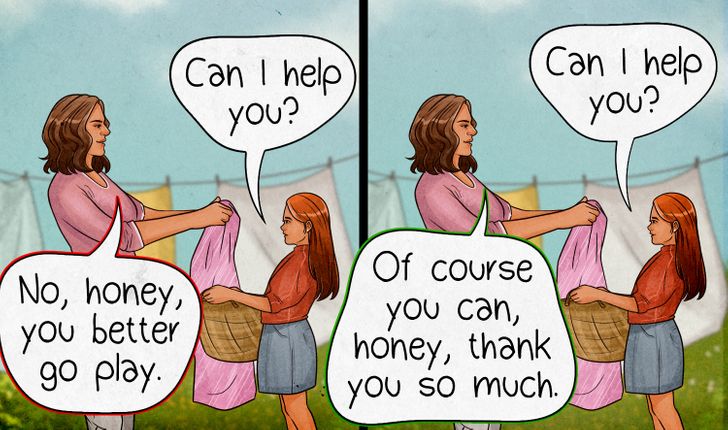
As the saying goes, “be thankful for small blessings,” and what better way to teach your child to appreciate the actions of others and to be thankful for them than by leading by example? We don’t mean the typical polite “thank you.” It goes far beyond good manners and politeness. In other words, what “thank you very much” means is: I know what you’ve done, I want you to know that I appreciate it and that it has made me happy. There are many occasions when we can show gratitude to our children:
- On a daily basis: we have an infinite number of reasons for which to thank our children: any kind of help they give us —like setting the table or taking out the trash— even if that something is their responsibility, like tidying their room.
- For their patience: many times, even if we don’t notice it, the little ones make really big efforts to be patient in moments when they are bored, for example, at the supermarket, waiting at the bank, or sitting in a traffic jam that doesn’t move forward. They would rather be playing, but they are there, waiting, and it would be a nice gesture on our part to thank them.
In addition to the reasons we have listed above, we know that your child is the apple of your eye, who puts joy and color into your life, who brings a smile to your face even in the worst moments, your main reason for pride and happiness, and all that also deserves a big “thank you.”
Which of these phrases do you use the most with your children? How do you reinforce their self-esteem?
Subscribe to our podcast on Spotify or Apple podcasts to enjoy our best stories and give a real treat to your ears.
Comments
simply Beauty
Related Reads
11 Safety Tips All Women Should Know Inside Out

12 Phrases That Can Be Harmful to Your Kid, and 12 Things to Say Instead
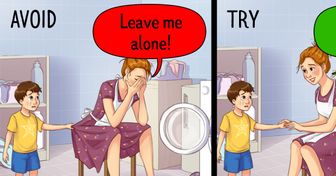
11 Stereotypes That Should Have Stayed in the Past, But Still Hurt Us Today

11 Real Concert Stories That Prove Anything Can Happen at a Show

10 People Whose Life Suddenly Made a U-Turn

16 People Who Just Wanted to Spend Their Money but Their Expectations Turned Into Disappointment

19 Movie Details Most Viewers Didn’t Notice at All

A Woman Avoids a Potential Stalker by Following Safety Advice She Read Online

10+ Terrible Designs That Made Us Shiver

15 Moments That Show Kindness Is Quiet but Changes Everything

18 Pets Who Proved They Understand the World Much Better Than We Think

15 Success Moments From Strangers That Deserve All the Golden Buzzers in the World
